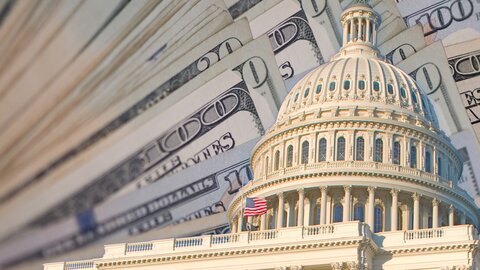The Congressional Budget Office (CBO) released new estimates on December 4 that show the effects of extending Trump’s first-term tax cuts, which expire at the end of 2025. On the surface, the congressional scorekeeper showed that the “Trump tax cuts won’t help the economy grow,” as the New York Times unhelpfully summarized. That headline cherry-picks a partial result to conclude precisely the opposite of what the CBO estimates show.
A better summary would read, “Extending Trump tax cuts will boost the economy, despite drag of massive government debt.” That debt drag presents another argument for cutting spending. Fiscal discipline through spending cuts could act like supply-side tax reform and turbocharge other pro-growth tax cuts and deregulation.
In a recent blog post, CBO Director Phill Swagel summarized two slide decks with separate estimates of the economic effects of extending the Tax Cuts and Jobs Act (TCJA) for individuals and businesses. The New York Times headline fixates on the first set of estimates for extending just the individual tax cuts.
The first set of slides shows that over time, the economic benefits of keeping individual taxes from increasing—primarily people working more than they would otherwise—are outweighed by the negative economic effect of more government debt.
In other words, when federal debt held by the public is more than $28 trillion, approaching 100 percent of gross domestic product (GDP), the benefit of mildly pro-growth tax cuts for individuals is outweighed by the economic costs of more debt.
The second set of CBO estimates turns that result on its head. The 2017 reforms paired tax cuts for individuals with tax cuts for businesses and investors. Some changes, such as the reduction in the corporate income tax rate, were permanent; others phase out or expire next year. According to the CBO, making the most pro-growth business tax cuts permanent—expensing for equipment and research—boosts potential GDP by about 0.4 percent in 2034 (about the size of the debt drag from the individual tax cuts).
Taken together, the CBO’s estimates for making both the individual and business tax cuts permanent imply extending the entire 2017 tax cuts would boost GDP by roughly 0.3 percent in 2034.
The CBO results also show that the business tax cuts are significantly more pro-growth than the individual tax cuts (scaling the economic boost by the size of the revenue reduction). This is consistent with other, more optimistic results from the Tax Foundation, which finds a permanent version of the TCJA grows GDP by 1.1 percent in the long run (with different assumptions about how debt impacts the economy).
The second missing piece of the story is that the economic risks of large government debts are not an immutable fact; the federal debt is a policy choice made by Congress. Making different choices, such as pairing tax cuts with spending cuts, would be massively pro-growth. The debt drag in the CBO model is the product of cutting taxes without offsetting spending cuts.
When deficits are high, cutting spending is its own supply-side reform. Pairing deficit-reducing spending cuts with pro-growth tax cuts reinforces the GDP-boosting effects of both policies. This is one result found in economist Alberto Alesina’s research on fiscal adjustments; large gaps between revenues and spending can create economic uncertainty for forward-looking investors and consumers who understand that spending levels determine the long-run tax rate. In this circumstance, cutting spending signals commitment to keeping taxes low—as opposed to the current fiscal path with no spending cuts and thus necessary tax increases. In a 2020 working paper, John Cogan, Daniel Heil, and John Taylor show that holding down projected expenditure growth can boost short- and long-run private investment, personal consumption, and GDP growth.
The headline from the CBO’s estimates is that the economic effects of pairing the most pro-growth business tax cuts with individual tax cuts outweigh the very real drag of large and growing government debt. However, this leaves massive economic gains on the table. The more important message for Congress is that signaling fiscal discipline to markets is its own supply-side tax cut that would turbocharge other policies like full expensing, lower business tax rates, and deregulation.

